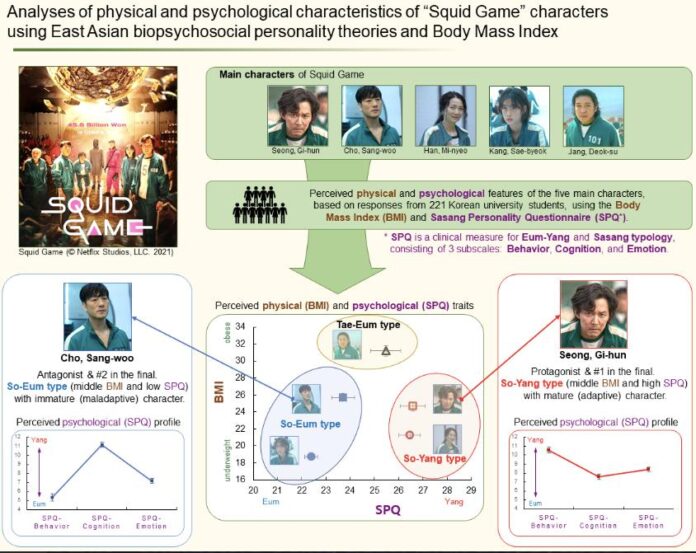Korean Medicine Expands into Humanities and Social Sciences
By Samuel Cho, L.Ac.
If you’re a fan of Squid Game, you’ll be intrigued by a recent study published in Korea. As Netflix’s globally popular series gears up for its Season 2 release in December, a paper analyzing the psychological and physical characteristics of characters from the Series has been published, drawing attention.
Busan National University recently announced that Professor Chae, Han’s, research team from the Department of Korean Medicine, had published a study in the international journal Behavioral Sciences analyzing how the general public perceives the psychological and physical traits of five characters from Squid Game.
Squid Game (2019), a Korean survival drama series that gained explosive popularity worldwide, depicts 456 participants in life-or-death games as they struggle with financial difficulties. The show blends various characters and social messages and became the first non-English-language work to win the Primetime Emmy Awards, the highest honor in American broadcasting. Riding the wave of global popularity, the second season is set to premiere on December 26.
Although Korean pop culture, including music, films, and dramas, has garnered worldwide attention in recent years, it has yet to fully explain Koreans’ mindset and cultural structure from an inherently Korean perspective.
In response, Busan University’s research team analyzed the psychological and physical traits of five characters from Squid Game using the psychophysiological theories and clinical tests of Korean Medicine. It is significant that the team scientifically analyzed the key characteristics of global Korean drama characters through indigenous Korean theories, marking a meaningful contribution to media psychology, which studies the socio-cultural value of the Hallyu (Korean Wave).
In this study, the research team analyzed the psychological and physical characteristics of male characters Seong, Gi-hun, Cho, Sang-woo, Jang, Deok-su, and female characters Han, Mi-nyeo and Kang, Sae-byeok. The psychological traits were diagnosed using the Sasang Personality Questionnaire (SPQ), which assesses the Yin-Yang psychology and Sasang typology, while body mass index (BMI) was used to measure their physical traits, such as body shape and obesity levels.
The analysis revealed that Seong Gi-hun and Han Mi-nyeo were categorized as So-Yang types, Cho Sang-woo and Kang Sae-byeok as So-Eum types, and Jang Deok-su as a Tae-Eum type, all showing distinctive psychological and physical characteristics.
The contrasting features of Seong, Gi-hun and Cho, Sang-woo heightened the tension of the story until the end. Seong, Gi-hun, displaying the traits of a mature So-Yang type, garnered empathy from viewers as the protagonist, while Cho, Sang-woo, with the immature traits of a So-Eum type, portrayed the antagonist who inevitably had to lose to the protagonist.
Similarly, Kang, Sae-byeok, as a mature So-Eum type, became a character that viewers empathized with, while Han, Mi-nyeo, an immature So-Yang type, added tension to the story through her contrasting personality and actions.
The research demonstrated that utilizing Korean indigenous psychophysiological theories in modern media psychology can provide a scientific analysis of complex characters. It also showed that Yin-Yang psychology and Sasang typology are useful in creating relatable, realistic characters and compelling drama narratives.
This research, led by Professor Chae, Han of Busan National University’s Department of Korean Medicine, with fourth-year student Seo, Seo-kyung as the first author and Professor Lee, Soo-jin of Kyungsung University’s Department of Psychology as a co-corresponding author, was published under the title Analyses of Physical and Psychological Characteristics of “Squid Game” Characters Using East Asian Biopsychosocial Personality Theories and Body Mass Index in the SSCI international journal Behavioral Sciences on October 8.
Professor Chae, Han of Busan National University said, “This study empirically demonstrates that Korea’s indigenous psychophysiological theories and knowledge can be applied not only in clinical diagnostics and treatment but also in diverse fields such as media psychology.” He added, “The Korean Medicine clinical psychological test, the SPQ, which was developed for Yin-Yang psychology and Sasang typology, is now expanding beyond the medical field into the humanities and social sciences.”
Professor Lee, Soo-jin of Kyungsung University stated, “Following previous analyses of characters from the animation Pororo and the game Overwatch, this study examined the characters from the drama Squid Game using the SPQ, a psychological test tool, to confirm universal psychological traits across the world. Moreover, this study uncovered subtypes of SPQ characteristics that had not been identified in previous research, marking a significant achievement. We plan to continue exploring these traits in local communities and clinical groups in the future.”
First author Seo, Seo-kyung, a Busan National University’s Department of Korean Medicine student, shared her thoughts: “I found it fascinating to analyze the mental and physical traits of globally popular drama characters using objective standard indicators and the Yin-Yang theory of Eastern medicine. Just as we analyzed characters based on their typological traits in this study, I hope to apply Sasang typology and Korean Medicine to various fields and become a Korean Medicine doctor who offers personalized treatments that consider patients’ personalities and psychological states.” (Source: Busan National University Public Relations Office)






































